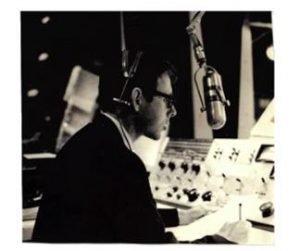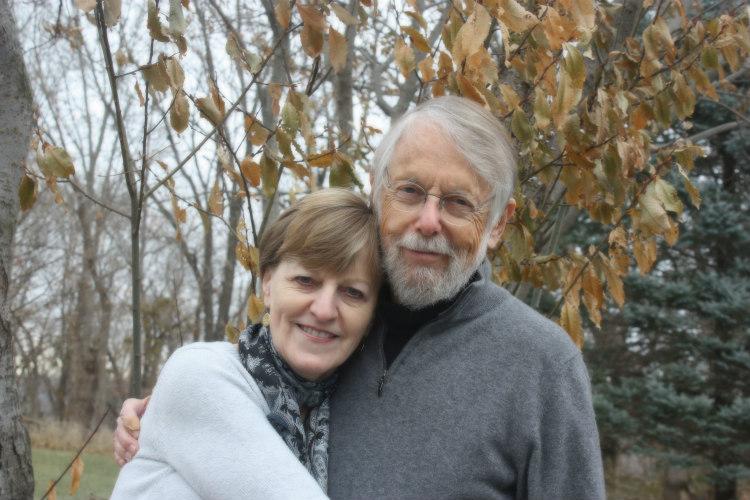by Patricia O’Dell
The late Gordon Spencer was a disc jockey and enthusiastic collector who interviewed jazz greats and other musicians and composers
Gordon Spencer interviewed many of the remarkable jazz artists of the 20th century including Billie Holiday, Duke Ellington and Louis Armstrong. He began his career in radio in 1951 at WSRN, the student radio station at Swarthmore College in Pennsylvania when he was a junior. His widow, Hannelore Rogers, has donated his extensive collection of albums, CDs and his reel-to-reel interview tapes to the Marr Sound Archives so enthusiasts and scholars can benefit from his remarkable career.
“Gordon loved jazz beyond anything else,” Rogers says. “He had two passions – radio and stage. As a little boy, his aunt gave him a pretend radio play set with scripts, a wooden microphone and sound effects equipment.”
This childhood gift led to a lifelong career. Spencer worked at radio stations along the East Coast starting when he was in college. Rogers met Spencer when they were both living in New York in the early 1980s.
“I listened to WNCN in the morning. There was this DJ, Gordon Spencer, and he was very funny and could pronounce all of the composers’ names. I wrote him a letter and said, ‘If you’re not married or the father of 10 children, call me.’”
Spencer did call, and took her to lunch at an Indian restaurant for their blind date. It lasted four-and-a-half hours.
He told her later, “classical music DJs don’t get a lot of fan mail.”
 “When he was at WNCN in New York, he started buying records to play on the air,” she remembers. “Once he had his own program, he would go to the public library to check out albums to play on his show. His passion was incredible. There was no limit to what he was willing to do.”
“When he was at WNCN in New York, he started buying records to play on the air,” she remembers. “Once he had his own program, he would go to the public library to check out albums to play on his show. His passion was incredible. There was no limit to what he was willing to do.”
Spencer’s collection includes 2,550 albums, 1,215 CDs and 165 reel-to-reel and cassette tapes of his interviews with musicians. While Rogers understood the significance of his work, it took her a while to find a home for the collection.
“After he died, I had to deal with his belongings. Clothes were easy to donate. But his office and his albums and tapes were in the basement. He spent a lot of time there and it was too painful for a long time for me to walk in.”
Eventually, she became concerned that if something happened to her, the collection might disappear.
“I was worried it would end up in a landfill or garage sale,” Rogers says. “I started asking around and someone referred me to Chuck Haddix at UMKC. When I spoke to him the first thing he told me was, ‘Whatever you do, don’t break up the collection.’”
Haddix, curator of the Marr Sound Archives, notes that the entire collection is impressive, but believes the interviews are the most exciting.
“Spencer interviewed an unbelievable amount of jazz greats as well as contemporary classical composers,” Haddix said. “A lot of the classical composers were very Avant-garde. Some were from Europe. Usually someone will have a very narrow focus, but Spencer’s interest was broad. He was also a radio producer, so the quality of his interviews is outstanding. They’re really great quality.”
Beyond technical quality, Spencer was a great interviewer.
“He really let people tell their stories,” Haddix says.
Haddix, who is also a radio producer and accomplished interviewer, thinks his understanding of the material and Spencer’s process may have helped Rogers.
“Donors have an emotional connection,” Haddix said. “Just as with Hannelore, it’s usually their partner’s life’s work and they want to do the right thing and memorialize their loved one. Now the collection will live forever.”
Haddix appreciates Spencer’s talent, taste and painstaking care of his collection. He says that it’s not unusual to develop a personal connection to the collector.
“Every collection tells a story. They’re all different. He was meticulous. Everything was very carefully selected. This collection represents his life’s work. As the recipient of the collection, you get to know them after the fact. Often I think, ‘I’d love to have met him.’”
Haddix and his team have begun preserving the collection. They are currently digitizing the open reels and creating a collection page with a search option. Once everything is catalogued and digitized, the collection will be searchable on the internet.
Haddix’s connection to the collection has made the donation process easier for Rogers.
“I have found UMKC to be so sensitive about what this meant to me,” Rogers says. “Gordon’s collection was something I had to let go. But when Chuck came and loaded the truck with all the materials, I knew UMKC would take excellent care of it.”

